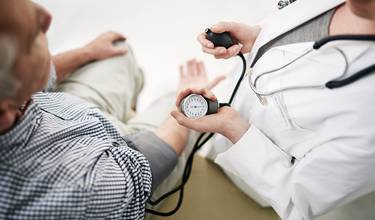Blood pressure is a phenomenon which most citizens understand. Some people might even have a blood pressure monitor at home, allowing them to keep track of their blood pressure from time to time. It is a well-known phenomenon that your blood pressure readings at home and at the doctor’s offers may differ; many experience a higher blood pressure at the doctor’s office because they are anxious, whereas their blood pressure readings when they are at home are normal.
This is called “white coat syndrome” or “white coat hypertension”, because the doctor’s white coat in itself might trigger hypertension in some patients. Others have “masked hypertension”, a situation where the blood pressure is high at home but normal at the doctor’s office. A study from University of Texas Southwestern Medical Center published in Journal of the American College of Cardiology shows that people with white coat syndrome and masked hypertension are at higher risk of developing cardiovascular diseases in the future.
People with either white coat syndrome or masked hypertension are often screened as normal because screenings in a calm environment show that they do not suffer from hypertension, but the study from Texas shows that these two groups are at higher risk of heart attack, stroke, and some types of organ damage than people who have normal blood pressure. In the study, researchers found that 3.3 percent of the participants had white coat syndrome whereas 17.8 percent had masked hypertension. Even though researchers controlled for age, sex, ethnicity, body mass index, smoking habits, cholesterol levels, diabetes and even a history of cardiovascular disease, the two groups with occasional hypertension were at higher risk of developing cardiovascular diseases later in life. Previous research in the field has otherwise suggested that the biggest risk of white coat hypertension is over-treatment.
Senior study author Dr. Wanpen Vongpatanasin believes that these are important factors, as many doctors do not consider these two conditions a real problem as opposed to chronic hypertension. Vongpatanasin believes that people who tend to experience hypertension at the doctor’s office will often respond in a similar way to other stressful events in life. In the long run, this may lead to chronic hypertension, but the intermittent hypertension is apparently a risk factor in itself as well.
A person’s blood pressure varies throughout the day depending on activity and fitness level. Hypertension is known to make you more susceptible to blood clots, stroke, kidney failure and constriction of arteries, and therefore this is often monitored in patients with diabetes or other predisposing factors for cardiovascular diseases. Blood pressure screenings are part of the package when patients undergo general health checks. According to WHO’s international guidelines, you will be diagnosed with high blood pressure if your reading is 140/90 mmHg. For diabetics, the numbers are 130/80 mmHg. However, a systematic review of Cochrane Library from 2013 shows that a lower blood pressure reading, as the only thing, for diabetics is associated with a decreased risk of stroke by 1.1 percent, whereas the risk of side effects caused by the blood pressure medication is increased by 2 percent. Thus, the conclusion of this study was that there was no reason to recommend lower blood pressures for diabetics.
Source:
http://www.huffingtonpost.com/entry/white-coat-syndrome-blood-pressure-hypertension_us_5641204ee4b0411d3072366e








